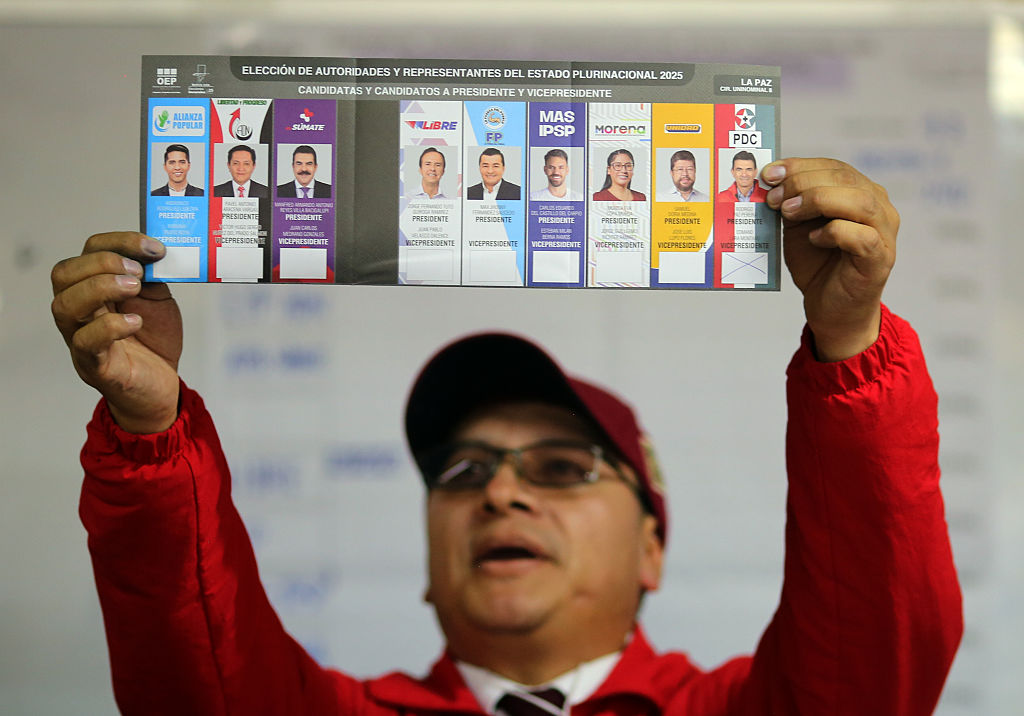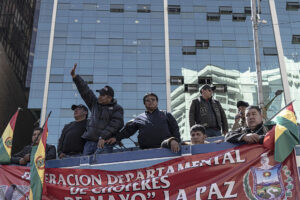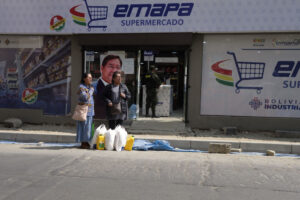With an economic crisis top of mind, Bolivians voted on August 17 for president, vice president, and all seats in both houses of the legislature. In the race for president, the dark-horse centrist Senator Rodrigo Paz Pereira obtained the highest share of valid votes in a crowded field with 32%, while former President Jorge “Tuto” Quiroga received the second-highest share with 27%, according to initial tallies.
The runoff election between Paz, the son of former President Jaime Paz Zamora (1989-93), and Quiroga will take place on October 19.
The results were a resounding defeat for the ruling Movimiento al Socialismo (MAS) party that had dominated the country’s politics for two decades. MAS presidential candidate Eduardo del Castillo won just 3%, and the party is set to lose its majorities in both houses of the legislature.
AQ asked analysts to share their reactions and perspectives.

Raúl Peñaranda U.
Editor of the Brújula Digital news portal
Rodrigo Paz was on the rise, but few could have predicted Sunday’s result. His performance can be explained by several factors.
First, a large part of the electorate was looking for a candidate who would bring change, and they found that alternative in Paz. Second, his running mate, former police captain Edman Lara, connected with poor and middle-class voters and took a strong stance against corruption, a particularly sensitive issue in Bolivia.
A third factor was his participation in the only presidential debate where all the candidates were present. There, Paz made a good impression in an event that attracted a large audience. Finally, a segment of voters that previously supported the MAS but became disenchanted after two decades of conflict and crisis leaned toward Paz, perceiving him as the candidate most attuned to their needs.
This election brings to a close a 20-year cycle of MAS hegemony and starts another, still uncertain cycle, hopefully marked by tolerance, democratic strengthening, and the pursuit of policies aimed at reducing poverty. The result in Bolivia signals another defeat for 21st-century socialism in the region.
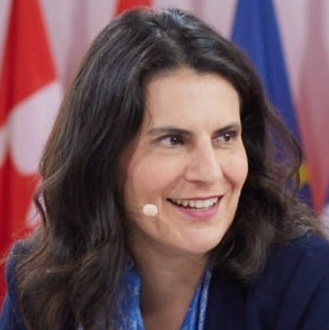
Gabriela Keseberg Dávalos
Political analyst and advisor
As so often happens, the polls in Bolivia got it wrong. The roughly 15% of undecided voters—and others who either shifted or were not captured by the polls—made quite a splash on election day. Rodrigo Paz, running with the Christian Democratic Party (Partido Demócrata Cristiano, PDC) and polling at less than 10% just a week ago, won the first round with 32%. While somewhat surprising, Paz’s performance reflects a coherent electoral logic.
Bolivians wanted change, and they wanted the Movimiento al Socialismo (MAS) out. But they also weren’t ready for a complete 180-degree shift. Instead, they rallied behind an underdog. A look at his scarce government program of only 25 pages shows that Paz represents a softer center-left, with a conservative Catholic touch and even a hint of progressive, e.g. when it comes to minority rights. The son of a former president (Jaime Paz Zamora), born in Spain during his father’s exile due to the military dictatorship, Rodrigo Paz combines political pedigree and experience with a calm, approachable demeanor. All this most likely resonated with disenchanted MAS supporters, while those who traditionally never supported MAS—especially in the lowlands around Santa Cruz, a conservative, business-oriented region—opted for Jorge “Tuto” Quiroga and Samuel Doria Medina.
For the first time in Bolivian history, there will be a second round, pitting Rodrigo Paz against Quiroga. The next president will face a highly fragmented Congress, with around seven parliamentary blocs represented. The vice president, along with the whips of each party, will be crucial in brokering consensus. They will have to work together to pass the reforms needed to pull Bolivia out of its deep crisis.
The MAS, the hegemonic power for two decades, is reduced to a shadow of its former self. What remains of the party lingers around Evo Morales’ former protégé and current Senate president, 36-year-old Andrónico Rodríguez, but now under a different party name. Instead of positioning Andrónico as a successor, Morales undermined him, unwilling to cede the stage.
Samuel Doria Medina, long seen as a frontrunner, conceded gracefully after placing third. In a measured speech, he praised the electoral process and pledged support for Paz. Such behavior—eschewing claims of fraud or conspiracy—is virtually unprecedented in Bolivia’s recent political history.
The runoff campaign will be fiercely contested. Whoever emerges victorious will face an unavoidable reality: the need for pragmatic coalition governance. Without it, efforts to stabilize the economy and restore public trust risk turning into paralysis and conflict.
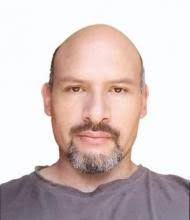
Lorgio Orellana Aillon
Research professor at the Institute of Social and Economic Studies at the Universidad Mayor de San Simón in Cochabamba
The destruction of the MAS has led to fragmentation. A large part of its former support has gone to Rodrigo Paz Pereira’s Christian Democratic Party, winner of the first-round vote. Paz’s running mate, former police captain Edman Lara, is known for denouncing corruption within the National Police, and garnered significant support by building a reputation as a heroic figure of humble origins that resonated among the less privileged classes that traditionally voted for Evo Morales.
The runner-up, Jorge “Tuto” Quiroga of the Libre Party, is more clearly right-wing, pro-privatization, and pro-neoliberal adjustment. On the other end of the spectrum, null and blank ballots together have narrowly surpassed Quiroga’s total, making them an unofficial second-place finisher. Former President Evo Morales, barred from running by the courts, encouraged his supporters to cast these ballots. This 22% shows a rejection of the electoral process by Morales supporters and others, a radicalization of the left, and the likelihood that significant numbers of people will embrace activism outside institutional politics, including street demonstrations.
Although important, this rejection from the left is relatively minor in the wider context. The center-to-right options represented by Rodrigo Paz, Tuto Quiroga, and Samuel Doria Medina (who garnered 20% of the vote) have all run explicitly neoliberal campaigns. Tuto Quiroga and Rodrigo Paz will go to a second round in October, and Samuel Doria has already declared that he will support Paz. The parties of these three contenders could form a majority coalition in the legislature, which would favor neoliberal policy packages and could mirror the oligarchic politics of the past.


